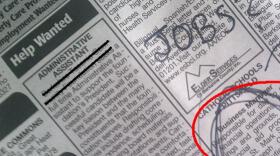There is great uncertainty about the impact the federal budget cuts, through the process known as sequestration, will have on the Massachusetts economy. But regional economists remain cautiously optimistic, according to an analysis released this week.
The Massachusetts economy should continue to grow next year because of a firming real estate market, relatively low unemployment and prospects for more exports- particularly to markets in Asia. The federal budget cuts could slow the state’s economy, but are not likely to plunge it into recession. This is according to an analysis of comments from regional economists published in the UMass economic journal, MassBenchmarks.
The report notes the Massachusetts economy had a relatively good year in 2012. The state’s gross domestic product growth exceeded national growth. The unemployment rate hovered around 6.5 percent, which is considerably lower than the national rate of 8 percent.
Daniel Hodge, Director of Economic and Public Policy Research at the UMass Donahue Institute says economic growth in 2013 will remain tepid
Nonetheless, Hodge says he is optimistic about the economy in western Massachusetts. He said investments in transportation and broadband infrastructure should start to pay off.
Jobs were actually lost, even in the education and healthcare sectors in the Springfield metro area, where the work force is aging and young people lack skills.
The MassBenchmarks report warned that the Massachusetts economy relies heavily on sectors that will be hit hard by federal budget cuts, including defense contractors and research institutes. An earlier report by the economic journal predicted the cuts would eventually cost the state 50,000 jobs. Hodge believes that estimate is high.
The idea behind the sequester was the cuts would be so onerous public complaints would prompt Congress and the White House to strike a deal to stop it. But, so far the tactic has not worked. Massachusetts Congressman Richard Neal said he’s heard from no constituents about the sequester
Neal voted against the sequester. He called it a fallow procedure and an artificial device.
The plan to lock in automatic budget cuts was produced in 2011 as the Republican- controlled House and the White House battled over raising the debt ceiling.




